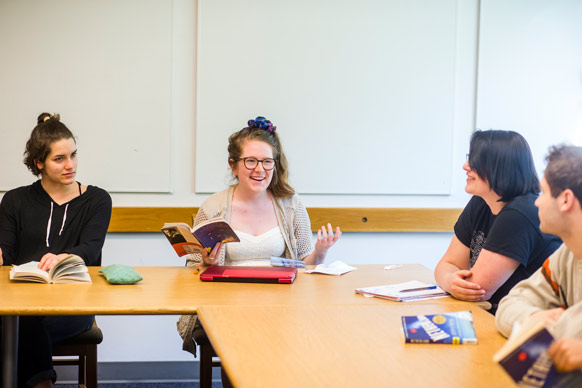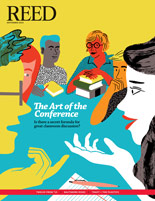
IRIS login | Reed College home Volume 94, No. 3: September 2015
The Art of the Conference (continued)

Photo by Leah Nash
Each Class is Unique
By Prof. Kate Ming T’ien Duffly [theatre 2012–]

Each conference group has its own unique culture. What works for one group might not work for another group. Recognizing this is one key element of a great conference. One of the things that makes Reed classes so exciting to teach is that they often include a mix of students from across the college. For example, in my recent class, “Race and Identity in American Theatre,” there were many theatre majors, but also majors from anthropology, chemistry, economics, psychology, and sociology departments. Because students in any given course do often bring such a wide range of areas of interest and relative expertise as well as learning styles, I typically begin the semester by working with the students to collectively create a set of guidelines unique to that group. These guidelines become our commitment as a group to actively engage in creating a productive and rewarding class together.
When composing these guidelines, I start by asking the students to consider what makes for productive discussions. How can we encourage participation and hear everyone’s voice? What do we do if a controversy arises? What do we do if we are feeling silenced? We then generate a list as a large group. As a group we also discuss some of the delicate aspects of cultivating an inclusive and productive classroom conversation, particularly when discussing a difficult or provocative topic. We generate ideas about how to remain engaged in the conversation even when we may be feeling afraid to contribute to the discussion. And we talk about experiencing discomfort with difficult conversations—for example about race, racism, and privilege—and allowing for moments of not knowing. Through such conversations, students have invariably come up with excellent guidelines for class, such as:
"Let the classroom be a space to test ideas."
"Make space for people to talk: Step up and step aside."
"Disagree compassionately."
"Accept when you are wrong and move on."
"Don't make assumptions about people."
"Recognize the difference between feeling uncomfortable and unsafe."
"Assume the best intentions in others."
At the halfway point of the semester, we check in as a group with our guidelines to see if we have been keeping our commitment to the class. Though there are often overlaps, each group’s list also varies in terms of the ideas or ethic that it emphasizes. These guidelines are thus a good opportunity to affirm that this is a unique group that has formed for one semester and must commit to each other and the class. They have proven to be an effective way of bringing the class together around an agreed-upon set of goals and guidelines and encouraging the active participation of all members of the class.
![]()
Getting out of the Way
By Prof. Walter Englert [classics 1981–]

Writing about what makes a good Reed conference isn’t easy, since there are many different models of conference teaching at Reed. I teach four kinds of courses: Greek and Latin language courses, advanced literature courses in Greek and Latin, Humanities 110, and classics courses taught in English translation. How I teach these different types of conferences varies, but no matter what the course, I have found that a great conference includes a number of essential ingredients: compelling material, a well-thought-out syllabus, students and faculty who are committed to going deeply into the material, and a willingness to learn from one another. In addition, the best conferences I have been a part of are ones in which I can gradually get out of the way, becoming less of a traditional teacher and more of a guide.
A good conference starts with an engaging topic and a syllabus made up of thought-provoking readings arranged in a sequence that enables the participants to get up to speed quickly and go deeper as the semester goes on. Everyone is responsible for reading the material carefully and contributing to class discussions. At the beginning of a semester, some people talk readily, while others are more reticent. But as the semester progresses, faculty and students find a balance in conference participation, as those who talk a lot learn to be more focused and concise, while others find their voices and contribute more to the discussion. As the group becomes more cohesive, members challenge each other to go further, helping everyone to engage with the material more productively. Ideally, there should also be opportunities for everyone to have a chance to lead the conference, taking responsibility for asking key questions and keeping the conversation going. Writing also plays an important role, whether in writing out points before conference to share with others, posting thoughts on a class Moodle, or developing ideas further in papers.
Ultimately, when a conference functions well, it is an amazing experience. It allows all participants in the class, faculty and students alike, to learn from the texts and each other. There is a sense of joy in taking the material to a deeper level of understanding, and becoming part of a group that learns together and is deeply invested in how much each one of us learns.

LATEST COMMENTS
steve-jobs-1976 I knew Steve Jobs when he was on the second floor of Quincy. (Fall...
Utnapishtim - 2 weeks ago
Prof. Mason Drukman [political science 1964–70] This is gold, pure gold. God bless, Prof. Drukman.
puredog - 1 month ago
virginia-davis-1965 Such a good friend & compatriot in the day of Satyricon...
czarchasm - 4 months ago
John Peara Baba 1990 John died of a broken heart from losing his mom and then his...
kodachrome - 7 months ago
Carol Sawyer 1962 Who wrote this obit? I'm writing something about Carol Sawyer...
MsLaurie Pepper - 8 months ago
William W. Wissman MAT 1969 ...and THREE sisters. Sabra, the oldest, Mary, the middle, and...
riclf - 10 months ago